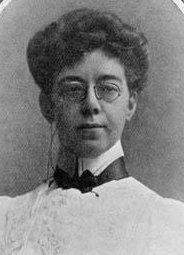Mary Angela Dickens
| Mary Angela Dickens | |
|---|---|

Mary Angela Dickens in about 1900
|
|
| Born | 31 October 1862 Kensington, Middlesex, England, UK |
| Died | 7 February 1948 (aged 85) London |
| Nationality | Great Britain |
| Occupation | Novelist |
| Known for | Oldest grandchild of novelist Charles Dickens. |
| Signature | |
 |
|
Mary Angela Dickens (31 October 1862 – 7 February 1948) was a British novelist and journalist of the late Victorian and Edwardian eras, and the oldest grandchild of the novelist Charles Dickens. She died on the 136th anniversary of her grandfather's birth.
Born at 46 Gloucester Road in London, and named after her aunt, Mary Dickens, Mary Angela Dickens was the eldest of eight children of Charles Dickens, Jr. and his wife Elisabeth Matilda Moule Dickens (née Evans) and the granddaughter of Charles Dickens, the famous novelist. She was the niece of the noted barrister and judge, Sir Henry Fielding Dickens, and the painter Kate Perugini. She was christened on 19 December 1862 at St Mark's church in St Pancras in London.
In the Dickens family she was known as 'Mekitty', and as a child she called her grandfather 'Venerables'. Mary Angela Dickens and Charles Dickens were very close, and when she scalded her leg and foot with boiling water while staying at his country home Gads Hill Place he sat beside her bed and held her hand, reassuring her that he would make her well.
As a child she was taken to hear Dickens perform A Christmas Carol during one of his last public readings, and later in life recollected her shock at seeing her grandfather crying over the death of Tiny Tim. She later wrote:
'The "Venerables" on the platform was quite a stranger to me, and his proceedings were so eccentric as to be most alarming. He took no notice of me, or of my mother; and yet it seemed to me that he never took his eyes off me. And to Tiny Tim himself I owe my one one intensely painful and distressing memory of my grandfather, for the climax of my discomfort was reached at last when it dawned upon my poor little faculties that "Venerables" was "crying." I never read the little scene in the carol where Bob Cratchit breaks down – the moment, I suppose, of this tragedy – without remembering the horror and dismay which seized upon me then. I knew nothing whatever about acting; any ideas I had about "pretending" were associated with the Christmas pantomime, and did not assimilate at all with the solitary appearance of my grandfather on a dull-looking platform. To me his distress was absolutely real. I had never before seen a grown-up person cry. I had not known that they ever did or ever could do so. And that "Venerables", of all people in the world, should cry with all those people looking on, and that no one should dare – as it seemed to me – to express sympathy, or offer consolation, was nothing short of an upheaval in my universe.'
...
Wikipedia
